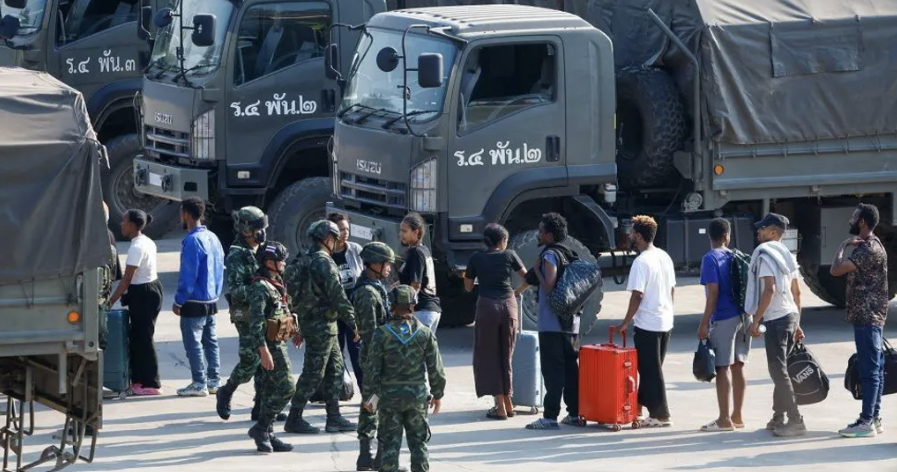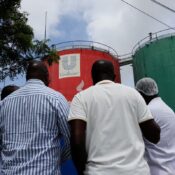
Further Concerns are mounting as Kenyans are rescued from human trafficking in Myanmar
46 Kenyans were successfully freed from human trafficking networks in Myanmar, where they were being held captive by a suspected Chinese cartel that pretended to be an internet scammer.
Kenya’s Ministry of Foreign and Diaspora Affairs acknowledged the rescue on Tuesday. It was the 24th rescue in a similar mission last week, out of a group of 261 foreigners who were freed after months of negotiations.
In a statement, the Ministry said that the Border Guard Force (BGF) and the Democratic Karen Buddhist Army (DKBA) assisted in the rescue.
The Democratic Karen Buddhist Army (DKBA) successfully secured the release of 261 foreigners from 18 different nationalities on February 12, 2025, 24 of whom were Kenyans, according to the Ministry of Foreign and Diaspora Affairs. According to the ministry, “the Kenyans’ release came after months of delicate negotiations led by the Kenya Embassy in Thailand in collaboration with various partners in Thailand and Myanmar.”
This comes after four Kenyans escaped to Thailand on February 8 and were subsequently apprehended by border security officers after receiving assistance from local citizens.
According to the ministry, “the four Kenyans are safe and are presently undergoing immigration processing before their repatriation.”
“The Kenyans and other foreign nationals were held in fraud centers located in areas controlled by rebel groups fighting the Myanmar government, making rescue operations extremely difficult,” claimed the ministry.
They will stay on Myanmar territory after being rescued before being turned over to the Thai administration.
“They are among hundreds of other foreigners who were trafficked to Myanmar late last year and forcibly used to commit various online crimes, including fraud, identity theft, phishing, romance scams, and cryptocurrency scams,” according to the ministry.
The rescue was a component of a larger campaign against computer fraud and people trafficking along the two nations’ border.
Many African victims said they were compelled “to meet monthly earnings targets of up to $50,000.” They would be tormented if they didn’t succeed.
They worked around the clock and were only permitted to sleep for two or three hours each day. According to Thai police, they were continuously abused while being held in dark cells.
Roseline Njogu, Kenya’s Principal Secretary for Diaspora Affairs, advised Kenyans looking for work overseas to only work with authorized and government-approved recruitment firms last week.
Ms. Njogu’s prudence was in response to growing worries about dishonest hiring practices that frequently coincide with global human trafficking organizations. She cautioned prospective employees about the risks involved with working with unlicensed organizations.
Numerous Kenyans and other East Africans were led to Myanmar, Laos, and Cambodia, supposedly to work as English language teachers, but instead became overworked, underpaid laborers, according to a government statement.
The issue has gotten worse, particularly because recruiters used bogus promises to entice other Kenyans to join them. According to the Kenyan embassy in Thailand, up to 140 Kenyans and other East Africans were recently rescued through collaboration with local authorities.
“Despite extensive warnings and awareness campaigns, the persistence of these scams remains a concern,” according to the embassy.
Kenyans are tricked by false job postings in Thailand, particularly in front desk, teaching, bitcoin, and customer service, “only to discover there are no such jobs when they arrive in Thailand.” According to the embassy, some Kenyans have become homeless in Bangkok, sleeping on the streets and begging for food from random people.
Fraudsters seek out employees who speak the languages of their targets, which are typically Chinese and English.
While some are willing to work, others are compelled to remain and can only be released if their families make substantial ransom payments. A few escapees have reported experiencing torture.
As part of a crackdown on the illegal compounds, the Karen Border Guard Force (BGF) announced on Saturday that it was getting ready to deport 10,000 individuals connected to cyber frauds in the region it controls to Thailand.
Foreigners who are frequently trafficked and forced to labor in scam compounds that have sprung up in Myanmar’s borderlands have defrauded people worldwide in an industry that analysts estimate is worth billions of dollars.
The daily deportations would be conducted in groups of 500.
According to Thai media, BGF leaders have arranged with the military task force in charge of border security in Tak province, Thailand, to accept 7,000 laborers from fraud facilities.
All Categories
Recent Posts
Tags
+13162306000
zoneyetu@yahoo.com


